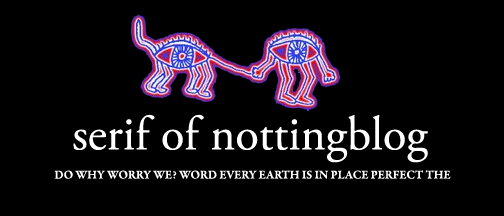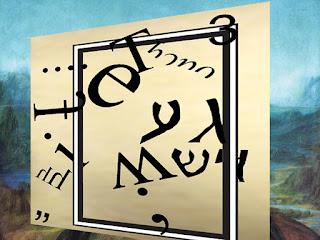WORDS CANNOT EXPRESS
a reply to Geof Huth's discussion of Against Expression.
1.
Poetry is everything that is the case.
2.
My emotion is your emotion.
But I’m just not feeling it.
I mean, where’s the love?
It’s poetry in emotion, but I’m feeling very notional.
Though these days, I’m feeling for all of us.
Words cannot express…
Just saying.
3.
Expression is a literary device. Like metaphor or…apophenia. It is also a human experience. Or so we say and think. How we conceptualize expression, emotion, the human, or the self may change, and is subject to (changes in) language, technology, culture, epistemology, ontology, psychology, and Facebook.
How emotion or the self (or selves) – the lyric, the semi-lyric, or the illyric, the lyrictus – appears in writing varies. Is TBA. The N/A may be. Or not.
Self-expression may be shelf-expression. Shelf-centred. Shellfish centred. Self-centaured. Selves-expression. Ex-expression. Oxpression (boustrophedalia). Santa and the selves. Crowed sourced. The cloud reveals its soul in the fog. The shadow in the absence of dog. We don’t necessarily express our selves in our expression.
They said my work was emotionally one-dimensional.
It hurt my feeling.
4.
The self and its effluvia – emotion – need not be present in writing. Possible but not necessary. The effluvia of some writing is the self, the way the broken mirror or the empty window are effulgentia of light. There may be emotion without the self. Or vice versa. (I know about this. I once had a girlfriend…)
One can always write ‘a sonnet’ about the reading experience.
Is there reading without the self? The feeling brain behind the reading face. Or fingers (if only four, in a white glove, big round ears like satellite dishes to the animated made-of-frames mind.)
Who turned out delight?
In what way is the conceptual expressive? Is the expressive conceptual?
Poetry still has a use to articulate, conceptualize, theorize, frame, and create paradigms for feeling and human experience. Non-human, neo-human, near-human. The not-the-author. I is an author. Readers are a book’s aphorisms. They see a self in the book.
We need to continually reinvent the wheel. The commonweal of expression. The dictionary of semaphore for flagless hermits. Braille for the inside of the body.
“Expression” has just become a more complex complex.
Here’s the formula (why was it so hard for you, Einstein?):
h=iΔe
where i=emotion, concept, the conceptualization of self, language, time, ducks, meaning,
writer, the concept of ‘writer’
e=time, culture, context, language, conceptual framework, quantity of tacos consumed, structure, use of Wellerisms, reader, the concept of ‘reader’
h=expression
And what about the ‘=’ sign? It is two letters seen from above. We do not know what they are.
The results can be calculated with extreme precision or an extreme lack of precision depending on whether one is on a train, in the 20th century, moving forwards or backwards against the motion of the text (boustrophedon is possible) or how one defines ‘one.’
Words can’t express how much I can’t express.
5.
Poetry is the case (a fact), the existence of states of affairs.
A poem is a thought.
A poem is a proposition with sense.
A poem is a truth-function of elementary propositions.
Whereof one cannot speak, thereof one must pass over in silence.
Except for this next thing.


Comments